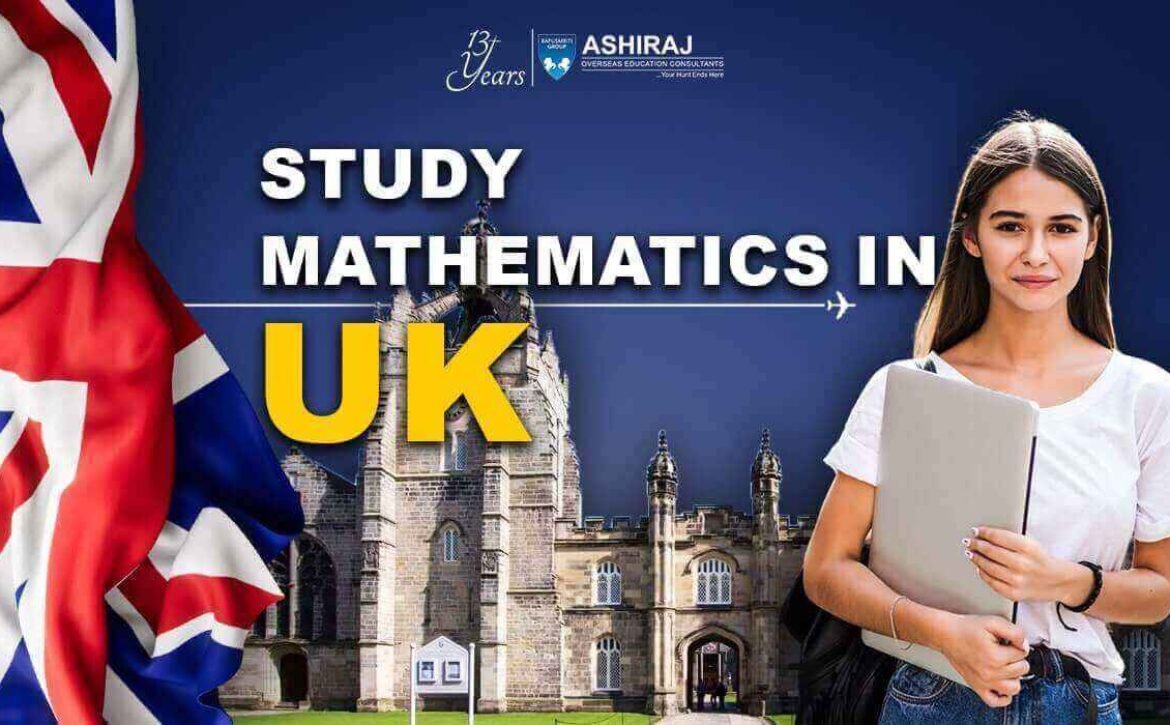
Mathematics in UK
Mathematics in the UK holds a significant place in both academia and industry, fostering innovation, problem-solving, and critical thinking skills. From the corridors of renowned institutions like the University of Cambridge and the University of Oxford to bustling classrooms in schools across the country, the study of mathematics permeates various educational levels. The UK has a rich history in mathematical discovery and application, with pioneers like Isaac Newton and Alan Turing paving the way for advancements in areas such as calculus, cryptography, and computer science.
Today, Mathematics in the UK continues to evolve, with universities offering a diverse range of programs tailored to different interests and career paths. Whether it’s pure mathematics, applied mathematics, or interdisciplinary studies, students have ample opportunities to delve into this versatile field. Furthermore, the demand for mathematicians in industries like finance, technology, and engineering underscores the practical importance of mathematical skills in the modern world. In essence, Mathematics in the UK remains a vibrant and indispensable discipline, shaping not only academic pursuits but also contributing significantly to societal progress and innovation.
Why to Study Mathematics in the UK?
- World-Class Education: The UK is home to some of the most prestigious universities globally, renowned for their excellence in mathematics education. Institutions like the University of Cambridge and the University of Oxford offer top-tier programs with world-class faculty.
- Rich Mathematical Heritage: The UK boasts a rich history in mathematical discovery, with influential figures like Isaac Newton and Alan Turing making groundbreaking contributions. Studying mathematics in the UK means immersing oneself in a culture steeped in mathematical tradition and innovation.
- Diverse Program Offerings: Universities in the UK offer a diverse range of mathematics programs, catering to various interests and career aspirations. Whether one’s passion lies in pure mathematics, applied mathematics, or interdisciplinary studies, there’s a program suited to every student’s needs.
- Career Opportunities: A mathematics degree from a UK institution opens doors to a wide array of career opportunities. With industries like finance, technology, and engineering in constant need of skilled mathematicians, graduates have ample avenues for employment and professional growth.
- Strong Support System: UK universities provide robust support systems for mathematics students, including dedicated faculty mentorship, research opportunities, and access to state-of-the-art facilities. This supportive environment fosters academic excellence and personal development.
In conclusion, studying Mathematics in the UK offers unparalleled educational opportunities, a rich mathematical heritage, diverse program offerings, abundant career prospects, and a supportive learning environment, making it an ideal choice for aspiring mathematicians.
Top Universities to Study Mathematics in UK
Rank | University | QS World University Ranking 2023 | Type of University | Average Annual Fees (GBP) | Programs Offered |
1 | University of Cambridge | 2 | Public | £9,250 | Mathematics, Applied Mathematics, Mathematical Sciences |
2 | University of Oxford | 5 | Public | £9,250 | Mathematics, Mathematical and Computational Finance |
3 | Imperial College London | 8 | Public | £9,250 | Mathematics, Pure Mathematics, Mathematics with Statistics |
4 | London School of Economics | 24 | Public | £9,250 | Mathematics and Economics, Mathematics with Economics |
5 | University of Warwick | 65 | Public | £9,250 | Mathematics, Mathematics and Statistics, Data Science |
Studying Mathematics in the UK offers access to some of the world’s top universities, renowned for their excellence in mathematical education and research. Here’s a list of the top universities in the UK for Mathematics based on the QS World University Rankings 2023:
- University of Cambridge: Ranked 2nd globally, the University of Cambridge offers a range of mathematics programs, including Applied Mathematics and Mathematical Sciences.
- University of Oxford: Ranked 5th globally, the University of Oxford provides programs such as Mathematics and Mathematical and Computational Finance.
- Imperial College London: Ranked 8th globally, Imperial College London offers programs like Pure Mathematics and Mathematics with Statistics.
- London School of Economics: Ranked 24th globally, LSE offers interdisciplinary programs like Mathematics and Economics.
- University of Warwick: Ranked 65th globally, the University of Warwick provides programs in Mathematics, Statistics, and Data Science.
Course Curriculum for Mathematics in UK
- Foundational Courses: Mathematics programs in the UK typically start with foundational courses covering topics such as calculus, algebra, and geometry to build a solid mathematical understanding.
- Specialized Tracks: Students can choose from various specialized tracks based on their interests, including pure mathematics, applied mathematics, statistics, and mathematical modeling.
- Advanced Topics: As students progress, they delve into advanced topics such as differential equations, complex analysis, number theory, and mathematical logic.
- Interdisciplinary Studies: Many programs offer opportunities for interdisciplinary studies, allowing students to combine mathematics with fields like computer science, physics, finance, and engineering.
- Practical Applications: The curriculum often includes modules focusing on the practical application of mathematics in real-world scenarios, such as mathematical modeling, data analysis, and optimization techniques.
- Research Opportunities: Students may have the chance to engage in research projects under the guidance of faculty members, contributing to advancements in mathematical knowledge and applications.
- Project Work: Some programs culminate in a final-year project where students apply their mathematical skills to solve complex problems or undertake original research.
- Industry Relevance: The curriculum is designed to equip graduates with the mathematical skills and knowledge sought after by industries such as finance, technology, and engineering, ensuring their readiness for the job market.
Studying Mathematics in the UK provides students with a comprehensive curriculum covering foundational concepts, specialized tracks, advanced topics, interdisciplinary studies, practical applications, research opportunities, and industry relevance.
Eligibility Criteria & Admission Requirements for MS in Mathematics in UK
- Language Proficiency: Applicants must demonstrate proficiency in English by providing scores for either the International English Language Testing System (IELTS) or the Test of English as a Foreign Language (TOEFL).
- Standardized Tests: Some universities may require scores from either the Graduate Record Examination (GRE) or the Graduate Management Admission Test (GMAT) as part of the application process.
- Academic Certificates: Applicants should submit academic certificates, including transcripts and diplomas, to demonstrate their qualifications and readiness for a mathematics program.
- Work Experience: While not always mandatory, relevant work experience in mathematics or a related field can strengthen an applicant’s profile.
- Passport & Student Visa: International applicants must possess a valid passport and obtain a student visa to study in the UK. The visa application process typically involves providing proof of acceptance to a UK institution and demonstrating sufficient funds to cover tuition and living expenses.
Test | Minimum Score |
IELTS | 6.5 |
TOEFL | 90 |
GRE | 160 (Quantitative) |
GMAT | 650 |
Ensuring compliance with these eligibility criteria is crucial for prospective students aiming to pursue Mathematics in the UK. Applicants should carefully review the requirements of their chosen universities and prepare necessary documentation to submit a strong application.
Documents Required for Studying Mathematics in UK
- Passport: A valid passport is essential for international students applying to study Mathematics in the UK, serving as proof of identity and nationality.
- Letters of Recommendation (LOR): Two or more letters of recommendation from teachers or professionals familiar with the applicant’s academic or professional achievements are typically required.
- Statement of Purpose (SOP): A well-written SOP outlining the applicant’s academic background, career goals, and reasons for choosing Mathematics in the UK is necessary to demonstrate their motivation and suitability for the program.
- Curriculum Vitae (CV): A comprehensive CV detailing the applicant’s educational qualifications, work experience, extracurricular activities, and any relevant achievements is required.
- Official High School Transcripts: Transcripts from high school or secondary education institutions provide evidence of academic performance and prerequisites for admission.
- Educational Certificates: Certificates of completion or graduation from previous educational institutions validate the applicant’s academic qualifications.
- Work Experience Certificate: If applicable, a certificate verifying relevant work experience in Mathematics or a related field strengthens the applicant’s profile.
- Proof of Financial Resources: Evidence of sufficient financial resources to cover tuition fees, living expenses, and other costs associated with studying Mathematics in the UK is essential for obtaining a student visa.
Ensuring the timely submission of these documents is crucial for a successful application to Mathematics programs in the UK.
Admission Process for Mathematics in UK
- Research Universities: Begin by researching universities offering Mathematics programs in the UK, considering factors such as reputation, program offerings, and location.
- Check Eligibility: Review the eligibility criteria set by each university, including academic requirements, language proficiency exams (such as IELTS or TOEFL), and standardized tests (like GRE or GMAT).
- Prepare Required Documents: Gather necessary documents, including passport, letters of recommendation (LOR), statement of purpose (SOP), curriculum vitae (CV), official transcripts, educational certificates, work experience certificates (if applicable), and proof of financial resources.
- Submit Applications: Complete the online application forms for selected universities, ensuring all required documents are attached and application fees are paid.
- Standardized Tests: Schedule and take required standardized tests, such as the GRE or GMAT, and language proficiency exams like IELTS or TOEFL, well in advance of application deadlines.
- Await Decision: After submitting applications, await admission decisions from the universities. This may take several weeks to months, depending on the university’s processing time.
- Accept Offer and Apply for Visa: Upon receiving an offer of admission, accept it within the specified deadline and begin the process of applying for a student visa, ensuring compliance with UK immigration requirements.
- Prepare for Arrival: Once the visa is approved, make necessary arrangements for accommodation, travel, and enrollment in the mathematics program at the chosen university.
Following these steps diligently will facilitate a smooth admission process for Mathematics in the UK.
“Education is the most powerful weapon which you can use to change the world.”
Nelson Mandela
Cost of Mathematics Course in UK
- Tuition Fees: The cost of tuition for Mathematics programs in the UK varies depending on the university and program level. On average, international students can expect to pay between £15,000 to £25,000 per year for undergraduate programs, and £20,000 to £30,000 per year for postgraduate programs.
- Living Expenses: Beyond tuition fees, students need to budget for living expenses, including accommodation, food, transportation, and personal expenses. The cost of living in major cities like London may be higher compared to other regions in the UK.
- Scholarships and Financial Aid: Many universities offer scholarships, grants, and bursaries to help offset the cost of studying Mathematics in the UK. Students are encouraged to explore these opportunities and apply for financial aid where eligible.
- Part-Time Work: Some students opt to work part-time during their studies to supplement their income. However, it’s important to balance work commitments with academic responsibilities.
- Healthcare: International students may need to pay for healthcare through the National Health Service (NHS) surcharge as part of their visa application process, unless exempt.
- Additional Costs: Other potential expenses include books, study materials, travel, and extracurricular activities.
Understanding and budgeting for the cost of studying Mathematics in the UK is crucial for international students planning to pursue their academic goals in the country.
Scholarships for Mathematics Courses in UK
Scholarship Name | Amount | Application Deadline |
Chevening Scholarships | Full tuition fees, living allowance, and other benefits | November (for the following academic year) |
Commonwealth Scholarships | Full tuition fees, living allowance, airfare, and other benefits | October (for the following academic year) |
Gates Cambridge Scholarships | Full tuition fees, living allowance, airfare, and other benefits | October (for the following academic year) |
Rhodes Scholarships | Full tuition fees, living allowance, and other benefits | Varies (depends on the country of application) |
Marshall Scholarships | Full tuition fees, living allowance, and other benefits | October (for the following academic year) |
UK Government Scholarships | Varies | Varies |
University-specific Scholarships | Varies | Varies |
Scholarships for Mathematics in the UK offer financial support to deserving students pursuing undergraduate, postgraduate, and doctoral degrees. These scholarships cover full or partial tuition fees, living expenses, airfare, and other benefits. Application deadlines typically fall between October and November, although this may vary depending on the scholarship and the academic year. Prospective students are encouraged to research and apply for relevant scholarships well in advance to maximize their chances of securing financial assistance for their studies in Mathematics in the UK.
Career Opportunities After Mathematics in UK
Job Profile | Average Salary (GBP) |
Data Analyst | £30,000 – £45,000 |
Actuary | £40,000 – £70,000 |
Statistician | £25,000 – £45,000 |
Financial Analyst | £35,000 – £60,000 |
Mathematician | £35,000 – £60,000 |
Operations Research Analyst | £30,000 – £50,000 |
Software Engineer | £35,000 – £70,000 |
Quantitative Analyst | £40,000 – £80,000 |
Risk Analyst | £35,000 – £60,000 |
Investment Analyst | £40,000 – £70,000 |
Mathematics graduates in the UK have access to diverse career opportunities across various industries, including finance, technology, healthcare, and government. These roles offer competitive salaries, with average earnings ranging from £25,000 to £80,000 per year, depending on factors such as experience, expertise, and location. Data-related professions like Data Analyst and Statistician are in high demand, with salaries typically ranging from £30,000 to £45,000. Actuaries, who assess financial risks and uncertainties, earn between £40,000 to £70,000 annually. Careers in software engineering and quantitative analysis also offer lucrative salaries, with potential earnings reaching up to £70,000 to £80,000 per year. With their strong analytical skills and problem-solving abilities, Mathematics graduates in the UK are well-equipped to pursue fulfilling and financially rewarding careers.
Frequently Asked Questions About Mathematics in UK
Some of the top universities in the UK for Mathematics include the University of Cambridge, the University of Oxford, Imperial College London, the London School of Economics, and the University of Warwick.
Entry requirements vary by university but generally include strong academic performance in mathematics and related subjects, language proficiency (IELTS or TOEFL), and sometimes standardized test scores (GRE or GMAT).
Yes, there are various scholarships available for Mathematics students in the UK, including the Chevening Scholarships, Commonwealth Scholarships, Gates Cambridge Scholarships, and university-specific scholarships.
Graduates of Mathematics programs in the UK can pursue careers as data analysts, actuaries, statisticians, financial analysts, mathematicians, software engineers, operations research analysts, quantitative analysts, risk analysts, and investment analysts, among others.
Yes, international students in the UK are generally allowed to work part-time during term-time and full-time during holidays, subject to certain restrictions and visa requirements.
The average cost of studying Mathematics in the UK includes tuition fees (ranging from £15,000 to £30,000 per year), living expenses, and additional costs such as books, study materials, and healthcare.
The duration of Mathematics programs in the UK varies depending on the level of study. An undergraduate degree typically takes three to four years to complete, while a postgraduate degree may take one to two years.
UK universities offer various support services for Mathematics students, including academic advising, tutoring, career counseling, mental health support, and assistance with accommodation and visa-related matters for international students.
Yes, many UK universities offer research opportunities for undergraduate Mathematics students through summer research programs, internships, and independent study projects supervised by faculty members.
International students can apply directly to UK universities through their online application portals, ensuring to meet the required deadlines and submit all necessary documents, including academic transcripts, language proficiency scores, and letters of recommendation.




